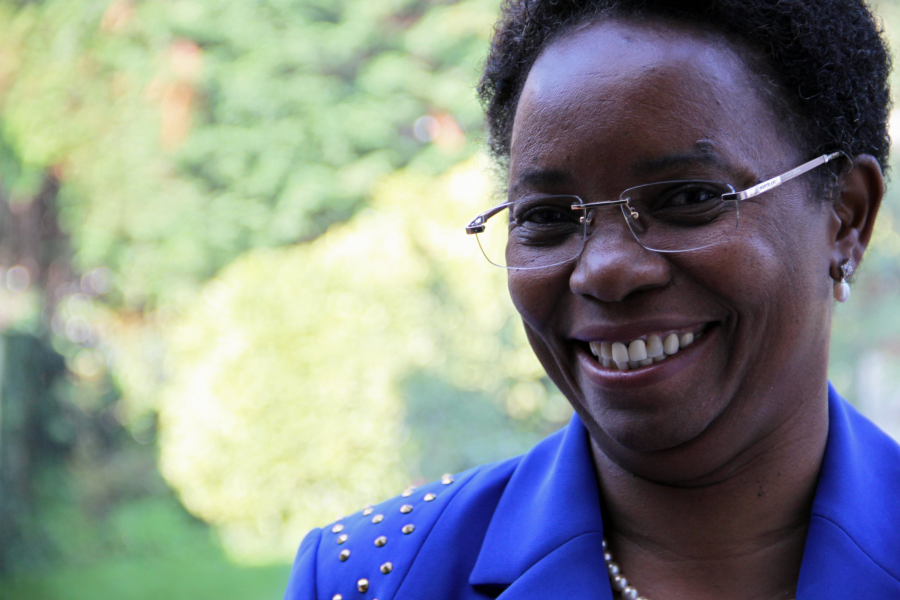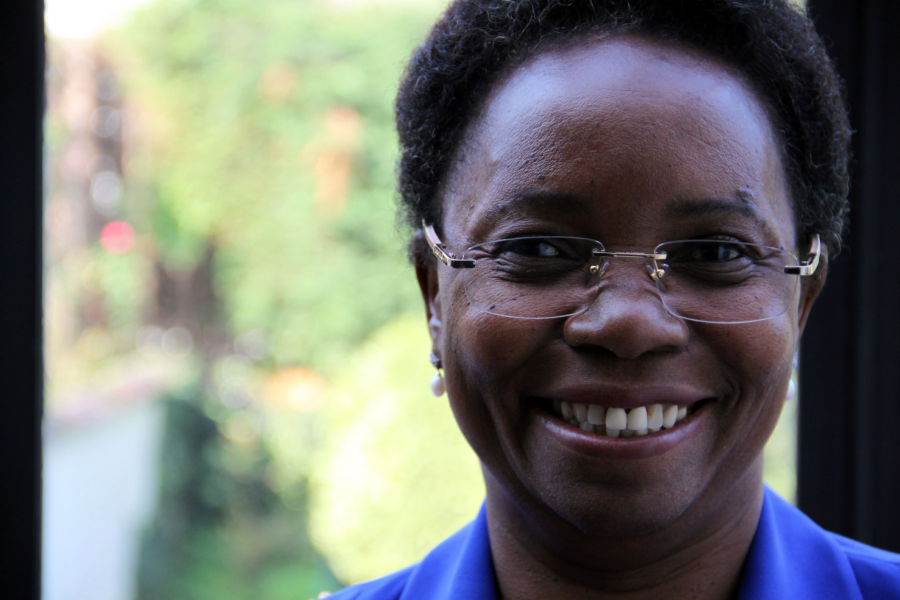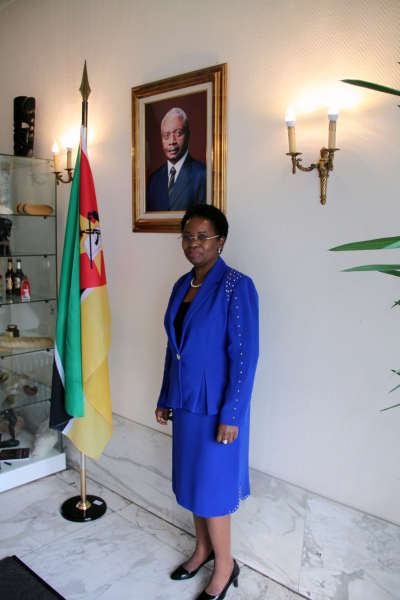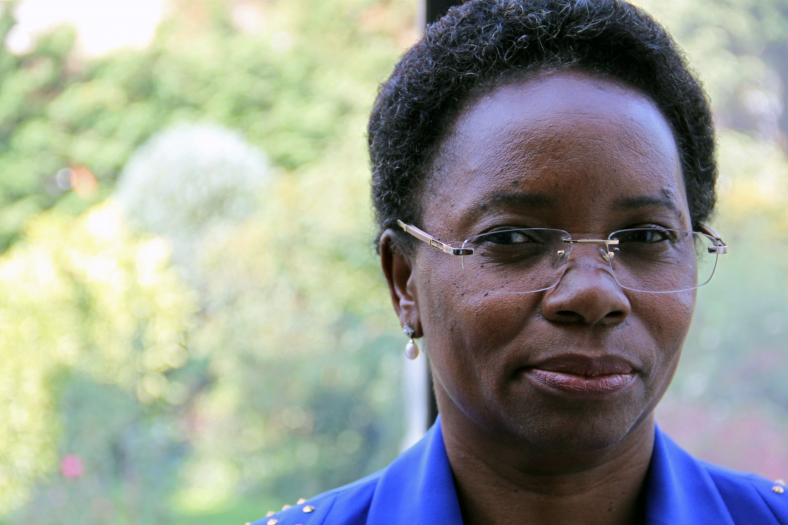Stefaan Anrys was jaren Afrika-journalist voor MO* en is nu docent aan de Arteveldehogeschool in Gent.
Donor darling Mozambique goes to vote with gas bonanza in mind
Today Mozambicans will cast their votes in general multi-party elections, for the fifth time after the ending of its civil war in 1992. Once a donor darling, this lusophone country in the South-East of Africa has recently discovered massive gas and oil fields up North. Still the exit out of poverty is not looming round the corner. An interview with Mozambican ambassador Ana Nemba Uaiene.

‘Only five years? That is little time’
© Stefaan Anrys
In 2012 Mozambique discovered huge gas reserves in the northern province of Cabo Delgado. Still it might take a while – probably until 2018 - to start up extraction, since this sector requires capital intensive and foreign industries to move in.
In the meanwhile, that other resource Mozambique has plenty of seems to be waning. Both Vale and Rio Tinto have pulled out of the Mozambican coal-industry. On top of this, Western donors cut their budget support and earlier this year, former rebel group Renamo took up arms again. Not all seems so rosy, in the run-up to the elections.
MO* interviewed the Mozambican ambassador in Brussels, H.E. Mrs. Ana Nemba Uaiene, about her take on recent events and the upcoming elections, scheduled for the 15 of October.
Mozambique is holding elections tomorrow. For the first time in the history of the ruling party Frelimo (Frente de Libertação de Moçambique) a northerner is the presidential candidate: former minister of Defence, Filipe Jacinto Nyussi. The north of the country seems to be gaining more power, now that it harbours massive gas reserves.
Ana Nemba Uaiene: Mozambique cannot be taken in terms of North, Center or South, as this has a potential to undermine the national unity. You know that Mozambique is a huge country with many resources. The resources are serving the whole country. This does not mean that if you have a resource in one region you cannot develop that region. Besides. People are thinking that Nyussi is the first candidate from the North. That is incorrect. Actually the president of the Republic, Armando Guebuza, was born in Nampula.
Earlier this year, the former rebels of Renamo (Resistência Nacional Moçambicana) had taken up arms again. Was it because they wanted their share of the new riches?
Ana Nemba Uaiene: People might think so, but the problem with Renamo did not arise now. After we had our first democratic elections, Renamo has always been participating in elections and they kept on loosing. So I would think for them it’s a way to come to power, not necessarily because of resources. Resources neither determined our civil war at the time.

‘President Guebuza and the leader of Renamo embraced each other’
© Stefaan Anrys
Having political power means having access to resources, to contracts.
Ana Nemba Uaiene: Of course, but I cannot affirm the hostilities were fuelled by the resources.
Do you think the elections will proceed peacefully? Is there now peace with Renamo?
Ana Nemba Uaiene: Yes, there is a truce. The dialogue started last year and on the 5th of September a declaration of cessation of hostilities was signed. Both the president of the republic and the leader of Renamo met, they embraced each other and they assured the people of Mozambique there would be no more hostilities.
What did Renamo most want?
Ana Nemba Uaiene: To revise the electoral law, although it had been approved by the parliament. You know that in Mozambican parliament we have three parties mandated: Frelimo, Renamo and the MDM. The electoral law was approved and most of Renamo did not agree. They even put the revision as a prerequisite for dialogue. The policy of the government is one of dialogue. In a spirit of openness, our government accepted to renegotiate the electoral law. They did and it was passed in a parliament with consensus this time.
Renamo wanted to have more representatives in the electoral commission?
Ana Nemba Uaiene: They wanted to politicize it. In trying to follow recommendations, including the ones made by European observers, the national commission was depoliticized and brought more civil society in. Renamo did not agree on that. In order to bring peace, that has been reversed now. The commission is repoliticized and has members of Frelimo, Renamo and MDM. Of course there still are some members present of civil society, but the weight now is very lean.
Which the Europeans might not like…
Ana Nemba Uaiene: Well, it is what the Mozambicans wanted.

President Guebuza of Mozambique watches over the Ambassador in Brussels
© Stefaan Anrys
Has Renamo given away their weapons?
Ana Nemba Uaiene: This is the process we start now with the collaboration of international observers. No opposition party should have arms. It is not normal.
Is there a deal to reintegrate Renamo-troops into the Mozambican army?
Ana Nemba Uaiene: Actually it is Renamo who has to give the numbers. You have to verify who is able to go to the army and who is able to go to the police. We had a cessation of hostilities the first time in the 1990’s. How old are these people? So if these are not new people it means they are not even entitled to go to the army. So they would have to be reintegrated into the social-political and economic live of the country.
Is the Movimento Democratico de Moçambique a challenge for Frelimo? Is it good to have a vibrant opposition party?
Ana Nemba Uaiene: By our constitution of 1990 the government, I mean the country is open for multiparty democracy. Anybody who wants to act politically, you know, is free to do so. It’s a free country in terms of democracy.
But only now they might become a real challenger…
Ana Nemba Uaiene: In the last election, MDM became third party to be elected. They only had eight MP’s and with eight MP’s they were not in a possibility to form a bench according to the rules of the parliament. But due to the openness, to the willingness of the other parties that were participating in the parliament, they gave an exception to the MDM to form a bench. Otherwise they could not have even a vote in the parliament. Democracy is not only on paper. In the case of Mozambique there is really space for that. It would also have been easy to crush Renamo, for instance, stating it was an illegal party. We did not. We have to act as brothers and sisters in one country. Our enemy is not the people, our common enemy is poverty. We fight in the parliament, we don’t kill each other.

‘We fight in the parliament, we don’t kill each other’
© Stefaan Anrys
Your enemy is poverty but you are likely to become one of the richest countries in Africa. Which challenges and opportunities lie ahead?
Ana Nemba Uaiene: One of the dangers that we are facing now is the expectancy of the people. Because people think now that Mozambique is rich, this will immediately be translated on their plate, in the individual pocket, in money. But things are not done that way. The challenges we have, as a government, is to transform and distribute these resources. Each one has to work, but the government can distribute this by providing infrastructure: schools, health unities, etc.. We need to form people who are able to work in the sector as well.
Yes, because you have a huge deficit in human capital.
Ana Nemba Uaiene: Exactly. The government is putting up not only legislation but also policies for the oil and gas sector. There are many professional and technical high schools in Mozambique, where people are being formed. We have invested even in Tete to form people specifically for the different fields linked to gas and oil. People are being trained abroad as people that will train others.
If there is an environmental disaster does Mozambique have the power and the leverage to tell the companies to pay? You had a minor spill by Anadarko already, close to a marine reserve!
Ana Nemba Uaiene: There is a law indeed, but we still have to develop it further.
Do foreign countries assist Mozambique in preparing for the gas and oil boom?
Ana Nemba Uaiene: We are lucky because we discovered this gas and petrol after other countries, so we can see how well or badly others did. I cannot single out a particular country but we have many that are assisting or are willing to assist Mozambique in this, including the Netherlands.
Did the oil and gas bonanza change how foreign countries approach Mozambique now? You were a donor darling!
Ana Nemba Uaiene: We still have good relationships with the European union and with single member states. There might be one or two countries that have difficulties and reduce their support. It is normal. Europe is in crisis. Notwithstanding the fact that European countries are struggling to recover, they continue to support Mozambique in different ways. At the same time, we don’t want to be too dependent. We had 48% of our national budget paid by donors, but now it came down to less than thirty percent.

‘We don’t want to be so dependent. We now collect more money from our taxpayers.’
© Stefaan Anrys
Are you suggesting some countries, because they are having an economic and financial crisis at home that they are cutting budget support. Britain and Germany had cut their 2014 budget support, presumably because Mozambique was borrowing and spending unwisely, knowing that they will have gas within 5 years.
Ana Nemba Uaiene: I’m not aware of that. I don’t know. I know about the countries where I am now: Belgium and the Netherlands. They are not supporting the government directly anymore, but due to other reasons. And they still give sectoral support. It is their choice. Although for us it would be easier to get budget support, since that is easier to plan.
There has been a lot of tension with local people being thrown off their lands, because of the coalmines, and resettled elsewhere. That might happen with gas too. How is Mozambique dealing with this problem?
Ana Nemba Uaiene: Resettlement has to be considered case by case. The government does studies of course. The policy of the government is to create conditions, before resettling people. We try to relocate people where they can continue their activities, economic but also social activities. We make sure they have schools, health centers, etc. But of course people are always attached. This is normal for any human being. You are attached to one place. Sometimes people are not very keen to move. Sometimes they think it is an opportunity to gain more money.
A last question… Mozambique within five years. What is your vision?
Ana Nemba Uaiene: Only five years? That is little time. Of course every plan is five years. I think poverty will remain the main challenge, as well as national unity. Without peace, we cannot develop. We have been talking much about oil and gas, but we shouldn’t forget that many Mozambicans are working and living in rural areas. In order to fight poverty, we thus also need to develop agriculture.
Maak MO* mee mogelijk.
Word proMO* net als 2798 andere lezers en maak MO* mee mogelijk. Zo blijven al onze verhalen gratis online beschikbaar voor iédereen.
Meer verhalen
-
Report
-
Report
-
Report
-
Interview
-
Analysis
-
Report










 Oxfam België
Oxfam België Handicap International
Handicap International